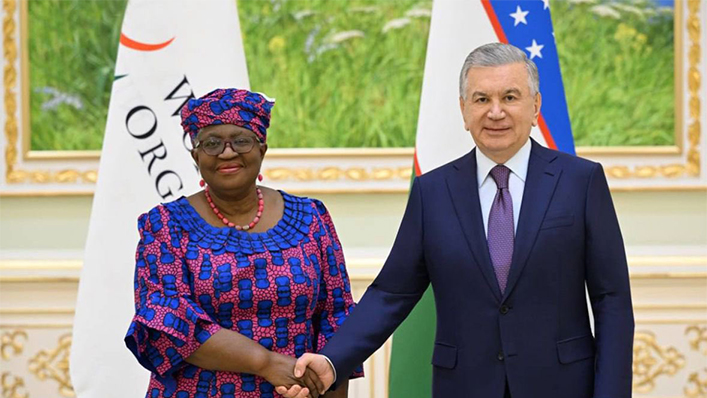
Director-General Okonjo-Iweala thanked President Mirziyoyev for his leadership and personal commitment to WTO accession which has played a key role in accelerating the negotiating process. She also held meetings with Deputy Prime Minister Jamshid Khodjaev, who serves as Chair of the Inter-Agency Commission on WTO Accession, and with the Advisor to the President on Economic Development Ravshan Gulyamov. They exchanged views on Uzbekistan’s accession process following the most recent Working Party meeting held on 24 May.
At the opening of the High-Level Conference on “Economic Reforms in Uzbekistan and the Process of Accession to the World Trade Organization” on 6 June, the Director-General was joined by Ms Saida Mirziyoyeva, Assistant to the President and Deputy Prime Minister Khodjaev. The Conference was organized by Uzbekistan and the WTO in partnership with the International Monetary Fund (IMF) and the World Bank. It was attended by representatives of the Government and development partners.
In her welcoming remarks, Ms Mirziyoyeva highlighted the bold economic reforms undertaken by Uzbekistan. She noted that the objectives of National Strategy “Uzbekistan 2030” included reaching the status of an upper middle-income economy, doubling the country’s GDP by 2030 and reducing the poverty rate to 7%. “These goals are achievable only with quality investments and access to global value chains. The World Trade Organization can serve as our global gateway in this regard,” she stated.
Director-General Okonjo-Iweala in her remarks commended the Government of Uzbekistan on its commitment and hard work in advancing the accession process, noting in particular the Presidential Decree of 3 June 2024 issued a few hours before her arrival in Uzbekistan. The decree directly touches upon several areas where members had expressed concerns, such as state-trading enterprises with exclusive rights, export restrictions, the import ban on ethyl alcohol, and export subsidies. This represents a bold step in moving towards consistency with WTO rules, she said.
Recalling that this year marks the 30th anniversary since Uzbekistan applied for WTO accession, she observed that the negotiations had accelerated over the last 12-18 months. “The conversation has shifted from if the accession will be concluded to when, and how,” she noted.
DG Okonjo-Iweala further noted that a successful accession requires five key ingredients. These comprise strong political will, an effective inter-ministerial coordination mechanism, a hard-working negotiating team led by a competent Chief Negotiator, support from partners, and an accession roadmap with time-bound actions. The first four ingredients are present in Uzbekistan’s accession, she said. To bring the accession to conclusion, she advised Uzbekistan to develop a government-wide roadmap to achieve consistency with WTO rules for each measure before 2026 and to focus on the areas where members had made specific requests.
“This part of the accession journey will not be easy. Real reforms are painful and may face internal opposition. But at the same time, they are not impossible,” she said. “I am more than confident in the wisdom of the leadership here to complete this accession journey, with the support of the international community.” Her full remarks are available here.
Deputy Prime Minister Khodjaev reported on the solid progress achieved in Uzbekistan’s accession process in the past few months. He stressed the intense policy reform agenda and highlighted several recent legislative developments aimed at compliance with WTO rules. He also said that “the ultimate goal of these reforms and the WTO accession process is to improve the lives of the people of Uzbekistan.”
“By fostering a more dynamic and open economy, [Uzbekistan is] laying the foundation for sustainable growth, job creation, and improved living standards for all citizens,” he added.
During her visit to Tashkent, the University of World Economy and Diplomacy (UWED), a member of the WTO Chairs Programme, awarded Director-General Okonjo-Iweala with an honorary degree. Delivering a lecture, she noted the importance of UWED for building expertise in Uzbekistan in international economics, international relations and international law. These are essential to advancing interests in trade policy and diplomatic relations more broadly, she added.
DG Okonjo-Iweala highlighted the continuing relevance of the multilateral trading system in a challenging era of geopolitical tensions and underlined the economic benefits of WTO accession. “The WTO’s fundamental role is to make world trade open, fair, stable and predictable – and to ground global trade relations in rules rather than power,” she said.
Director-General Okonjo-Iweala also shed light on how the WTO could assist Uzbekistan and other Central Asian countries in meeting current challenges, including climate change, economic diversification, job creation and greater socioeconomic inclusion.
Under WTO rules, market access would be enhanced with more predictable tariffs, raising the confidence level in the economy, the DG said. She highlighted the potential of Uzbekistan in several areas, including cotton production, renewable energy and the development of critical minerals value chains.
Noting the benefits Uzbekistan could reap from strengthened transport networks in the region, she said that hard infrastructure needs to be combined with trade policy connectivity – including making border crossings and procedures as seamless as possible.
Share
Reach us to explore global export and import deals